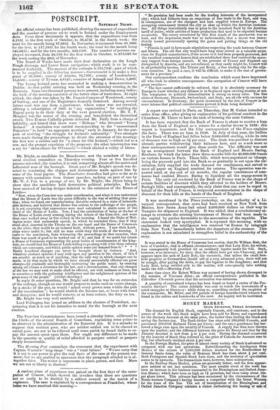Mr. Bright, as candidate for Manchester, met the members of
his ge- neral election committee on Thursday evening. Four or five hundred Mr. Bright, as candidate for Manchester, met the members of his ge- neral election committee on Thursday evening. Four or five hundred persons attended; the number, it is said, comprising almost all the active and influential men of the borough. Great part of Mr. Bright's speech was de- voted to combating the charges and insinuations made against him by some of the local papers. The Manchester Guardian had gone so far as to tamper with quotations from former speeches, tacking on part of one by -Mr. W. J. Fox to a passage of one by Mr. Bright; the object being to
show that the candidate held destructive political principles. He had been accused of having designs inimical to the existence of the House of Lords— "Now, when the Corn-law was under consideration, and when it was understood that the House of Lords was the great difficulty in the way of settling that ques-
tion; when we found our manufacturing districts reduced to a state of indescrib- able distress, and believed that House was callous to the sufferings of the people, it is not surprising that expressions were used calculated to alarm some of the timid of the House of Lords. Now, I had the satisfaction of being at the bar of the House of Lords every evening during the debate of the Corn-law, and more than once walked away at five o'clock in the morning. I heard the Duke of Wel- ington make that memorable speech, in which he reminded them, that if they stood aloof, deserted by the Throne on the one hand and the House of Commons on the other, they would be an isolated body, without power. I saw their Lord- ships wince under it; but still no man could deny the truth of the warning. I came to the conclusion, from witnessing the proceedings on that occasion, that there was much of good be worked out of it; and that if we could but return a House of Commons representing the great bodies of constituencies of the king- dom, we should find the House of Lords willing to go along with it for those reforms which are necessary, and which public opinion must yet demand from it." • * Really beneficial changes can never be brought about by violence. "And, whatever abstract opinions I may hold upon any question in the closet, of this I am sensible as much as of anything, that the only way in which changes can be made, is by that mode by which we have already successfully effected one great change—by gradually and thoroughly instructing the public mind; by creating
among all classes a reverence for the law, and a determination, that any changes of the law we may seek to make shall be effected, not with rashness or force, but in accordance with the gathering intelligence and the enlightened opinions of the great mass of the people." (Great cheering.) In reply tb some questions, Mr. Bright said that he was for an extension of the suffrage' though no one would propose to make such an entire change,
by a stroke of the pen, as would " admit every grown man within the pale of the constitution "; he would abolish the Income-tax, as beset with fraud and deception; and he would remove, or at least reduce, the duty on tea.
Mr. Bright was very well received.
Lord Pollington has issued an address to the electors of Pontefract, an- nouncing that it is not his intention to stand for the borough at the next election.


































 Previous page
Previous page